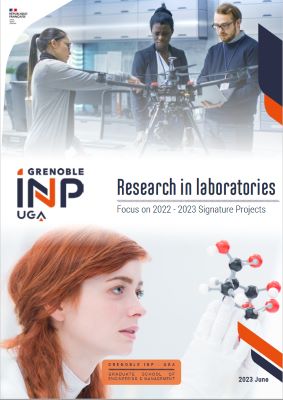Finally, the emergence of new technologies must help to provide greater well-being for dependent people. The “Senior living” living lab intends to capitalise on digital technology in order to promote homecare among others things.
First of all, adding information technology in homes helps to anticipate and meet the needs of the occupants by trying to provide optimised management of their comfort and safety. “This can range from a monitoring webcam to a movement detection system connected to an alarm system if necessary.”
At the same time, it is essential to provide a system that makes life easier and which fosters access to all kinds of home automation systems for the physically disabled, individuals suffering from loss of independence or those who have been weakened by various forms of illnesses. A study carried out amongst a sample of potential users by Michel Vacher, researcher at CNRS at the LIG and manager of the ANR Sweet-Home project, revealed that users would like to remain independent and have full control over their daily life. Therefore, it is not a question of automating all the basic actions but rather of making them easier and ensuring that the user does not perform actions that may lead him or her towards a situation of risk such as of fall for example. “It is not our intention for example to have the coffeemaker start up at a set time” explains Michel Vacher. “The usual tactile interfaces should be complemented by more accessible interfaces that do not require perceptive abilities such as vision or movement thanks in particular to a voice control system; they will be especially useful whenever the individual has extreme difficulties in moving around even momentarily.”
Grenoble INP is also taking part in other similar projects, such as the ANR CIRDO project geared towards studying recognition of an elderly person’s voice in order to detect distress calls.
The objective is then to give life to all these objects and services. In this regard, a project hotel will be set up in partnership with the business incubator Inovallée, in order to create a company that will market the most promising concepts stemming from these works.
Cooperation with INPG Entreprise SA was also considered with the idea being to set up an on-line prototype sale system and to only fund their manufacturing when a certain number of orders are placed. Other stakeholders such as Grain, Gravit, Pétale and the newly created SATT are also involved.
First of all, adding information technology in homes helps to anticipate and meet the needs of the occupants by trying to provide optimised management of their comfort and safety. “This can range from a monitoring webcam to a movement detection system connected to an alarm system if necessary.”
At the same time, it is essential to provide a system that makes life easier and which fosters access to all kinds of home automation systems for the physically disabled, individuals suffering from loss of independence or those who have been weakened by various forms of illnesses. A study carried out amongst a sample of potential users by Michel Vacher, researcher at CNRS at the LIG and manager of the ANR Sweet-Home project, revealed that users would like to remain independent and have full control over their daily life. Therefore, it is not a question of automating all the basic actions but rather of making them easier and ensuring that the user does not perform actions that may lead him or her towards a situation of risk such as of fall for example. “It is not our intention for example to have the coffeemaker start up at a set time” explains Michel Vacher. “The usual tactile interfaces should be complemented by more accessible interfaces that do not require perceptive abilities such as vision or movement thanks in particular to a voice control system; they will be especially useful whenever the individual has extreme difficulties in moving around even momentarily.”
Grenoble INP is also taking part in other similar projects, such as the ANR CIRDO project geared towards studying recognition of an elderly person’s voice in order to detect distress calls.
The objective is then to give life to all these objects and services. In this regard, a project hotel will be set up in partnership with the business incubator Inovallée, in order to create a company that will market the most promising concepts stemming from these works.
Cooperation with INPG Entreprise SA was also considered with the idea being to set up an on-line prototype sale system and to only fund their manufacturing when a certain number of orders are placed. Other stakeholders such as Grain, Gravit, Pétale and the newly created SATT are also involved.





